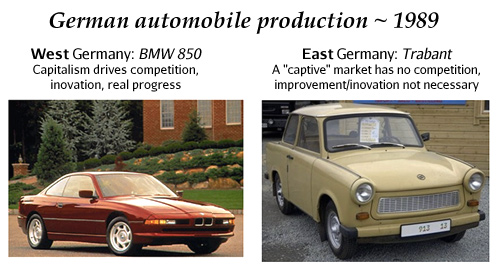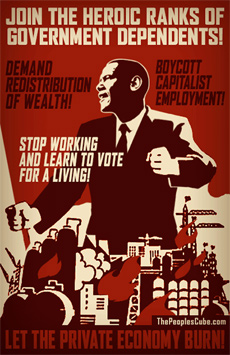FEE (Foundation for Economic Education) recently published an excellent article at that should be required reading for all high school students: Communist Economics in One Page: A Refresher Course. The author, Marian L. Tupy, grew up in communist Czechoslovakia, witnessing firsthand the soul-sucking nature of that bankrupt ideology. In this piece he exposes the myth of the socialist utopia that so many Bernie supporters seem enamored with, by contrasting it with free-market capitalism.
Here’s a simple visual comparison – take your pick ~

Communist producers were protected from domestic competition by having a monopoly. They were also protected from foreign competition by prohibitively high import tariffs or an outright ban on imports. Put differently, they had a “captive” consumer base. The Trabant car manufacturer did not have to worry about losing consumers, since the latter had nowhere else to go.
Moreover, the workers at the Trabant car plant received the same salary irrespective of the number of cars they produced. As a result, they produced fewer cars than were needed. People in East Germany had to wait for many years, sometimes decades, before they were able to buy one. Indeed, shortages of most consumer goods, from important items such as cars to mundane items such as sugar, were ubiquitous. Endless queuing became a part of everyday life.
[See Venezuela]
Advocates of communism often rail against capitalists as useless and immoral, but they’re neither ~
For example, capitalists often invest in new technologies. Companies that have revolutionized our lives, like Apple and Microsoft, received their initial funding from private investors. Because their own money is on the line, capitalists tend to be much better at spotting good investment opportunities than government bureaucrats. That is why capitalist economies, not communist ones, are the leaders in technological innovation and progress.
Moreover, by investing in new technologies and by creating new companies, capitalists provide consumers with a mind-boggling variety of goods and services, create employment for billions of people, and contribute trillions of dollars in tax revenue. Of course, all investment involves at least some level of risk. Capitalists reap huge profits only when they invest wisely. When they make bad investments, capitalists often face financial ruin.
While capitalism motivates through self-interest, communism motivates through fear. Although they initially tried propaganda ~
Posters of strong and determined workers were ubiquitous throughout the former Soviet empire. Movies about hardworking miners and farmers were supposed to instill the population with socialist zeal.
Propaganda alone could not increase the productivity of communist workers to Western levels. To incentivize the workforce, communist regimes resorted to terror.
Workers who slacked off on the job were sometimes convicted of sabotage and shot. More often, they were sent to the Gulag – a system of forced labor camps. Sometimes, the authorities arrested and punished completely innocent people on purpose. Arbitrary terror, the communists believed, made the rest of the workforce more productive.
And then, the tragic legacy of communism that so many contemporary history books conveniently leave out ~
In the end, tens of millions of people in the Soviet Union, China, Cambodia, and other communist countries were sent to labor camps. The living and working conditions in the camps were inhuman and millions of people perished.
My great uncle, who was accused and convicted of being a supporter of the underground democratic opposition in communist Czechoslovakia, was sent to mine uranium for the Soviet nuclear arms program. Working without any protection from radiation, he died of cancer.
Communism offers nothing but equal misery for all – excluding a tiny elite ruling class of course. It encourages nothing good; low productivity, inefficiency, apathy and corruption ~
In order to have something to trade with one another, people first had to “steal” from the state. A butcher, for example, stole meat and exchanged it for vegetables that the greengrocer stole. The process was inefficient, but it was also morally corrupting. Lying and stealing became widely used and trust between people declined. Far from fostering brotherhood between people, communism made everyone suspicious and resentful.
Human nature precludes any economic system from being perfect; we aren’t flawless, so nothing we create will be. But dozens of social constructs over thousands of years of civilization have given us a model that creates the greatest good for the greatest amount of people: free-market capitalism.





